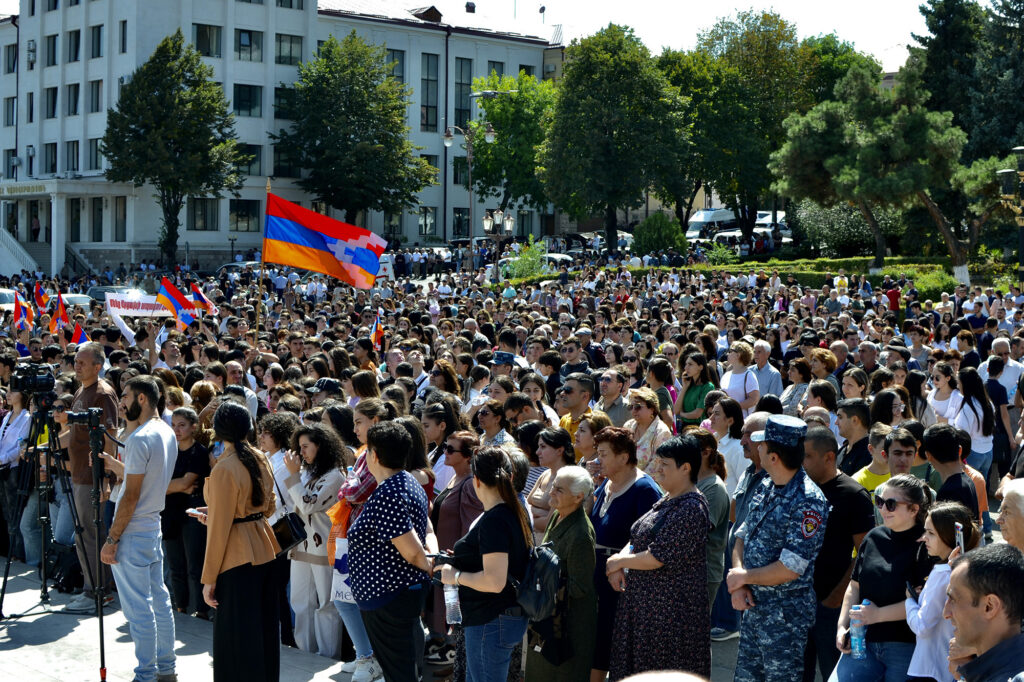Protests have erupted in Armenia and Nagorno-Karabakh over what appears to be a miscommunication by Prime Minister Nikol Pashinyan regarding a possible peace deal with Azerbaijan.
Several thousand protesters started gathering in the Armenian capital Yerevan on the evening of 14 September to demand Prime Minister Pashinyan’s resignation over his controversial statements about a potential peace agreement with Azerbaijan.
The agreement, as Pashinyan said in a televised speech in parliament that night, would guarantee ‘lasting peace and security’, with Armenia retaining its Soviet-era borders. Pashinyan made no mention of the status of Nagorno-Karabakh in the possible deal, sparking outrage among the population.
‘We want to sign a paper, as a result of which we will be criticised, cursed, called traitors… the people may even decide to remove us from power. But we will be grateful if as a result of this Armenia receives lasting peace and security on an area of 29,800 square kilometres’, Pashinyan said in his speech.
Later on, Pashinyan and Parliamentary Speaker Alen Simonyan went live on Facebook, dismissing reports that an agreement was currently being prepared to be signed, adding that there is ‘no document’ or ‘plan to sign a document in the near future’.
He stressed that the status of Nagorno-Karabakh has been and will be addressed by Armenian authorities in future negotiations with Azerbaijan.
During the livestream, Simonyan emphasised that the Nagorno-Karabakh conflict was not a ‘territorial issue for Armenia and has never been such’, but rather ‘an issue of rights’ — including the ‘right to self-determination’.

Despite their attempts to calm the situation, the protests continued to grow bigger, and protestors threatened to chase after members of the ruling Civil Contract party to their homes should they refuse to address the crowd.
The protestors demanded that parliament impeach Pashinyan, as the opposition would require votes from Civil Contract MPs to initiate the process.
In response to the protestors’ demands, a ruling party MP, Vahagn Aleksanyan, said that the military authorities would send the protestors to the border, urging them to prepare to ‘use their energy in the conflict zone’.
Among the organisers of the protests was Vardan ‘Dog’ Ghukasyan, a popular political social media influencer and former police officer. Ghukasyan pushed the narrative that an agreement between Armenia and Azerbaijan was imminent through his social media channels to drive more people to join the protest.
The few thousand protesters stayed in front of the parliament building until late at night, and promised to continue the protest on 15 September.
Similar protests took place in Armenia’s second-largest city, Gyumri, where the rally was relatively small and quiet compared to the demonstration held in Yerevan.
In Gyumri, protestors blocked the main avenue of the city, Sayat-Nova, calling on Pashinyan to drop the agreement — again, despite the Prime Minister’s assurances that such an agreement did not exist.
Some of the protestors told local media that they were planning to join protests in Yerevan.
Stepanakert protests
Pashinyan’s speech on 14 September also sparked protests in the capital city of Nagorno-Karabakh, with a few thousand people gathering in the centre of Stepanakert to demand the resignation of the Armenian government.

In response to the speech, Nagorno-Karabakh President Arayik Harutyunyan took to Facebook to affirm the position of the disputed region; it rejects any status within Azerbaijan because ‘the people of Artsakh [Nagorno-Karabakh] decide their own destiny in their own homeland’.
A while later, Harutyunyan echoed Pashinyan’s reassurances, saying that he was aware of the negotiation process, and that no document — or ‘even a draft’ — was expected to be signed soon.
‘I emphasise that, according to the agreement reached with the Armenian authorities, any document to be signed by them must take into account Artsakh's interests and the opinion of the people of the republic’.
The protests in Stepanakert renewed on 15 September, with around 4,000 protestors gathering once again in the city centre.

Nagorno-Karabakh’s Parliamentary Speaker, Artur Tovmasyan, addressed the crowd and urged the people of Nagorno-Karabakh to join the rally.
‘The fate of the Republic of Artsakh and the people of Artsakh has not been and will not be the monopoly of any person or political power’, Tovmasyan said in his speech.
‘It is unacceptable to make statements, interviews, and positions without taking into account the opinion of the people of Artsakh and the authorities elected by the people of Artsakh.’
Despite Harutyunyan’s and Pashinyan’s reassurances, the protestors demanded that the President of Nagorno-Karabakh come and explain the agreement that the Armenian Prime Minister had discussed the night before.
Early in the morning, Harutyunyan and several politicians from Nagorno-Karabakh arrived in Yerevan to hold ‘political consultations with Armenia on the Artsakh issue’.
While in Yerevan, Harutyunyan confirmed that he had taken part in an Armenian Security Council session, stressing once again that ‘at this stage, no document related to the status of Artsakh is being discussed’.
‘I conveyed all of our concerns, emphasising that no document can subordinate the right and aspirations of our people to live free and sovereign. The Armenian authorities have reaffirmed that without discussing with the Artsakh authorities and taking into account the opinion of our people, no document related to Artsakh will be signed’, he said.
For ease of reading, we choose not to use qualifiers such as ‘de facto’, ‘unrecognised’, or ‘partially recognised’ when discussing institutions or political positions within Abkhazia, Nagorno-Karabakh, and South Ossetia. This does not imply a position on their status.




 15 September 2022
15 September 2022



